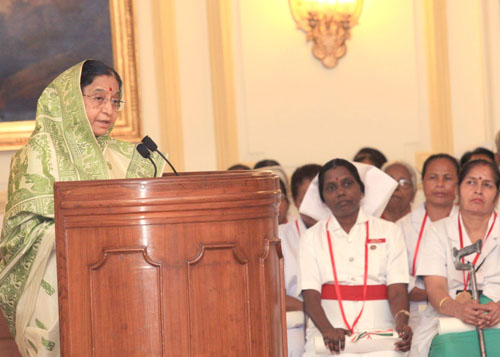Speech by Her Excellency the President of India, Shrimati Pratibha Devisingh Patil, at the Presentation of National Florence Nightingale Awards for Nursing Personnel
Rashtrapati Bhavan, New Delhi : 12.05.2009

Ladies and Gentlemen,
At the outset, I would like to convey my congratulations to the Nursing Personnel who have won Awards today. This is a recognition of their hard work and dedication to the nursing profession.
Nursing always brings to my mind the work done by Florence Nightingale - the lady who is the pioneer of this profession and a symbol of care and commitment. As she went from corridor to corridor of the hospital looking after the sick and the injured, she came to be known as the Lady with the Lamp. She rendered selfless service without caring for her own security or her own exposure to danger and disease. She also had exceptional organizational skills and a great capacity to meet challenges. It is for this reason that it was also said that behind the Lamp was a Lady with a Will. As we celebrate the International Nurses Day, I would call on nurses to take a pledge to work with the spirit of service as was exemplified by Florence Nightingale.
The role of nursing has been significant in the past; it remains so and will be vital in the future also. Nursing constitutes a very important strand of the healthcare system. While doctors diagnose and treat the disease, it is nurses who take pre-and-post operative care of the patient. They ensure the administering of medicine in a timely manner and regularly monitor the progress of the patient.
I would like to mention six points regarding the role of a nurse in healthcare and in society and the qualities necessary for rendering effective nursing care.
First and foremost, nursing requires a humane touch. It is the human element that makes a huge difference in the recovery of the patient. This approach is crucial, as the patient is usually in an anxious state of mind when unwell. Nurses, therefore, should deeply understand human nature and the psychology of patients. Thus, in their profession, psychology is as important as the pathology of the disease. As a result, re-assurance with empathy is something that becomes a duty for the nurse.
Second, caring for the patient has to be done with utmost care and with highest standards of professionalism. So a nurse must have the requisite knowledge to handle medical equipment and provide sound medical counsel to patients.
Third, nursing would need to evolve over a period of time to respond to new demands and new techniques. With changing lifestyles and altered demographic structures, nurses would need to meet emerging healthcare requirements. The new century has brought more focus on healthy life-styles and self-care. Everyone may need to be taught the basic skills and knowledge of healthcare. Nurses will help people to help themselves and will do for people what they cannot do for themselves. In such a scenario, the role of the nurse will be that of an enabler, a facilitator and a manager of care. Nurses should constantly upgrade their skills to meet these varied functions. At the same time, there will be greater use of sophisticated medical technology, calling for more specialization by nurses.
Fourth, a constant vigil of the personal hygiene of the patient, makes recovery faster and speedier. A nurse has to ensure this rule is adhered to without fail and these aspects are explained to the patient as well. Today, medical waste is one of the grave environmental challenges confronting us. Nurses can play an important role in the safe disposal of medical waste as its segregation and handling begins from the bedside of the patient.
Fifth, as nursing personnel remain in constant communication with the patient, observing patterns of recovery and monitoring their parameters, their role as innovators in providing better healthcare to the patients must not be overlooked. As part of routine work, a nurse collects useful data which can be valuable input for medical research, and I am happy that some of the nurses who have wone awards today having written booklets on their observations.
Sixth, it is essential for nurses to look beyond the role of administering care to patients and embrace some social responsibility. To achieve the national objective of delivering primary healthcare to all, nurses must join in the efforts to take medical services to the doorsteps of the people in villages, remote and tribal areas including economically weaker sections in cities and towns. They can contribute to creating awareness about healthy practices, disease prevention, and provide vital maternal and child healthcare services to the community. I would like to point out the need to improve the nurse-patient ratio in the country. This aspect calls for an increase in nursing colleges.
Nursing calls for high professional ethics and sensitivity and compassion towards patients that would ensure that the process of treatment and recovery becomes a journey that leaves a feeling of well being and being cared for. Nursing, indeed, is service towards humanity. For them the guiding principle should be "Seva Parmo Dharma" - service is the highest duty. Nurses take care of patients as affectionately as a mother or a sister takes care of us when we fall ill at home. Therefore, I always feel that is the reason why we call her Sister. I think as this is a noble profession, society should treat them with respect. Issues relating to their working conditions and other welfare measures deserve our consideration.
I congratulate all those who have been recognized today and hope that this will motivate others too, to perform with the same degree of competence and efficency.
Thank you.
Jai Hind.
